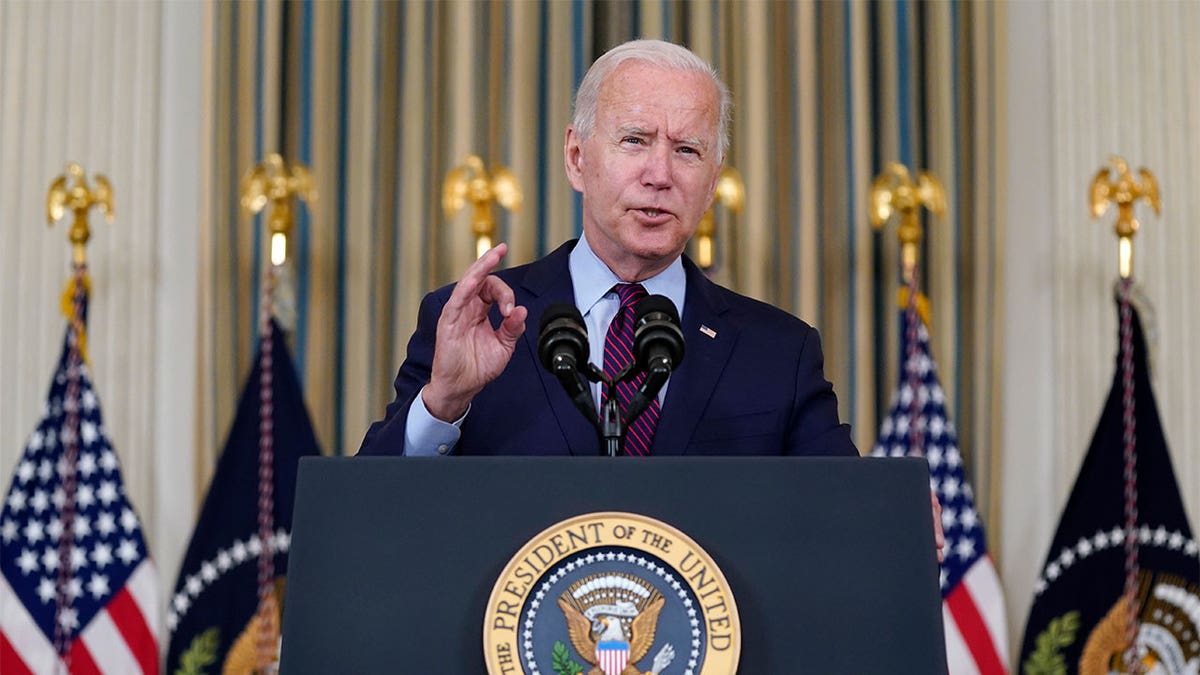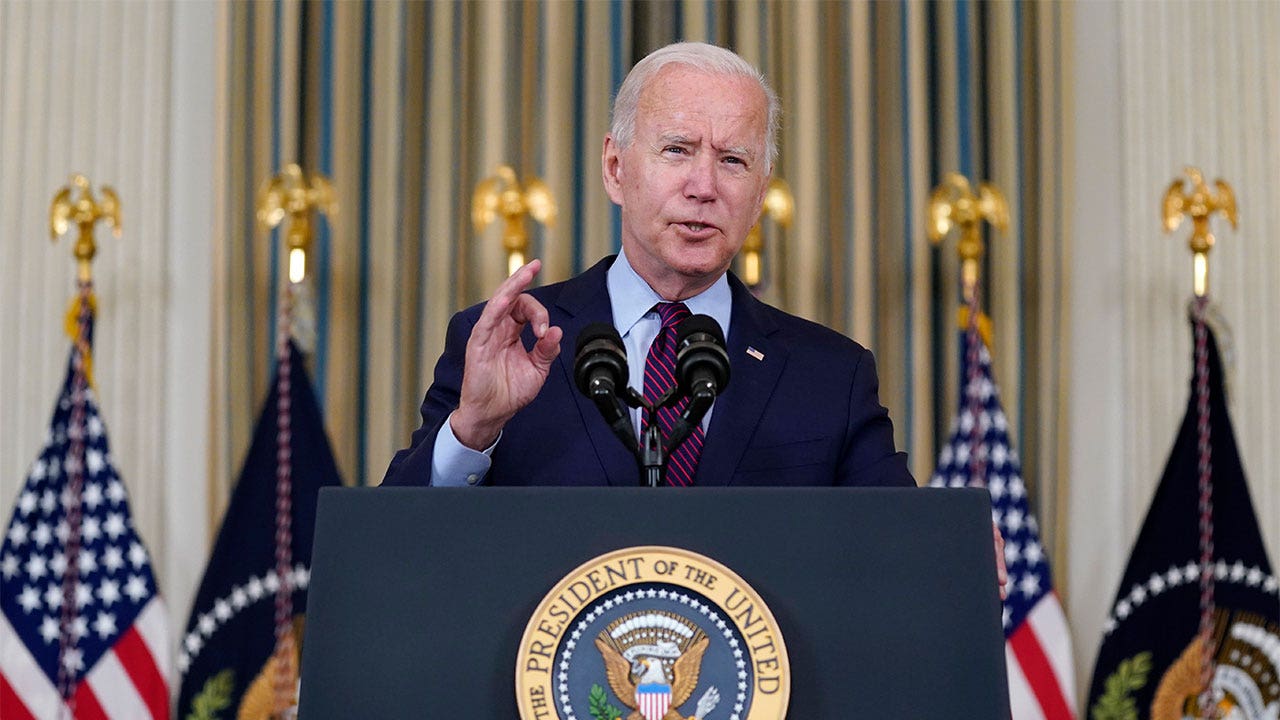[ad_1]
The political landscape in Washington, D.C. is always rife with rumors, whispers, and speculations. Recently, one such whisper has gained notable traction, raising eyebrows across the nation. A report indicates that President Biden is displaying signs of decline in private meetings with congressional leaders. This news has stirred conversations, sparked debates, and left many wondering about the future of American leadership.
The Report: What’s Been Said?
In a bustling Capitol Hill, the latest buzz isn’t just about legislative battles or policy debates. Instead, it’s centered around President Joe Biden. According to an anonymous source close to congressional circles, Biden has shown signs of cognitive decline during private meetings with key congressional leaders. These private sessions, often meant to strategize and negotiate, have reportedly been marked by moments of confusion, forgetfulness, and a lack of focus.
What Are the Specific Signs?
The report highlights a few specific instances:
- Repeated Questions: Biden has allegedly asked the same questions multiple times in a single meeting.
- Memory Lapses: Forgetting names, dates, and previously discussed topics.
- Attention Drift: Struggling to maintain focus during lengthy discussions.
Such claims have, unsurprisingly, led to a flurry of reactions from all corners of the political spectrum.

White House officials claimed criticisms of Biden's mental acuity were motivated by partisan politics. (Anna Moneymaker/Getty Images)
Reactions From Capitol Hill
The revelation of Biden’s potential decline has drawn mixed responses from congressional leaders. Let’s take a closer look at how different factions are responding.
Democratic Leaders
Democrats have largely rallied around the President, dismissing the report as speculative and politically motivated. House Speaker Nancy Pelosi stated, “President Biden has always been a steady hand in turbulent times. Any suggestion otherwise is just a distraction from our legislative goals.”
Senator Chuck Schumer echoed similar sentiments, emphasizing Biden’s extensive experience and ability to navigate complex political waters. “He’s as sharp as ever,” Schumer remarked. “These rumors are just that—rumors.”
Republican Leaders
On the other side of the aisle, Republicans have seized upon the report as a point of criticism and concern. Senate Minority Leader Mitch McConnell commented, “It’s imperative that our nation’s leader is operating at full capacity. If there are legitimate concerns about President Biden’s cognitive abilities, they need to be addressed.”
Representative Kevin McCarthy added, “The American people deserve transparency. If there are signs of decline, it’s our duty to ensure that the President can fulfill the demanding responsibilities of his office.”
Impact on Policy and Governance
Beyond the political rhetoric, the question remains: How might these alleged signs of decline affect policy and governance?
Legislative Negotiations
Private meetings with congressional leaders are crucial for legislative negotiations. If Biden is indeed struggling, it could hamper the administration’s ability to effectively broker deals and push through key initiatives.
- Economic Policy: With critical economic decisions on the horizon, from infrastructure spending to budget approvals, effective communication and strategic thinking are paramount.
- Foreign Policy: Diplomatic negotiations require sharpness and a deep understanding of complex global issues. Any cognitive decline could impact the U.S.’s standing on the world stage.
Executive Decision-Making
The President’s ability to make quick, informed decisions is vital. In areas like national security, where response times can mean the difference between peace and conflict, any perceived decline is particularly concerning.
Historical Context: Presidential Health
Concerns about presidential health aren’t new. Throughout history, several presidents have faced scrutiny over their physical and mental well-being.
Past Presidents Under the Microscope
- Woodrow Wilson: Suffered a severe stroke in 1919, leaving him incapacitated for the remainder of his term.
- Franklin D. Roosevelt: Struggled with polio and kept much of his condition hidden from the public.
- Ronald Reagan: Questions arose about his cognitive health, particularly toward the end of his second term, with some speculating about early signs of Alzheimer’s.
Public Perception and Media Coverage
How the public perceives these reports can significantly impact Biden’s presidency. The media plays a critical role in shaping this perception.
Mainstream Media
Mainstream outlets have approached the story with varying degrees of scrutiny. Some have called for a deeper investigation, while others have treated it as mere political gossip. Major networks like CNN and MSNBC have largely focused on defending Biden, highlighting his recent accomplishments and public appearances where he seemed robust and in command.
Social Media and Alternative Outlets
On platforms like Twitter and Facebook, the conversation is more polarized. Hashtags like #BidenDecline and #CognitiveTestNow have trended, with users debating the validity and implications of the report. Alternative news sites, often more critical of the administration, have used the report to bolster claims of Biden’s unfitness for office.
The Role of Age in Politics
Biden, at 81, is the oldest sitting president in U.S. history. This fact alone has fueled ongoing discussions about age and its impact on political leadership.
Age vs. Experience
Proponents argue that Biden’s extensive experience is invaluable, providing a wealth of knowledge and a steady hand in governance. Critics, however, suggest that advanced age can lead to a natural decline in cognitive abilities, which may affect decision-making and leadership.
What’s Next?
Given the contentious nature of this report, what steps might we see moving forward?

Medical Examination
There are calls from some quarters for a comprehensive medical examination of the President, focusing specifically on cognitive health. Such an assessment could either allay fears or confirm suspicions, impacting Biden’s ability to lead.
Transparency Measures
Increased transparency regarding the President’s health could be a way to address public concern. Regular updates from medical professionals, akin to press briefings, might become more common.
Conclusion
The report suggesting President Biden displays signs of decline in private meetings with congressional leaders has undeniably stirred the political pot. As the nation watches closely, the implications of these claims will unfold over time. Whether this is a case of political maneuvering or a genuine concern about the President’s ability to lead, one thing is clear: the conversation about age, health, and presidential capability isn’t going away anytime soon.
In the end, it’s crucial for both the public and political leaders to approach this issue with a balanced perspective, ensuring that the best interests of the country remain at the forefront. As always, the truth will eventually surface, and the resilience of American democracy will be put to the test once more.
Q: Has the White House responded to the report?
A: Yes, White House officials have dismissed the report as unfounded and politically motivated, asserting that President Biden is fully capable of fulfilling his duties.
Q: What are congressional leaders saying about the report?
A: Responses are mixed. Democratic leaders defend Biden’s cognitive abilities, while some Republican leaders call for more transparency and medical evaluations.
Q: How does Biden’s age compare to previous presidents?
A: Biden is the oldest sitting president in U.S. history at 81. Previous presidents, like Ronald Reagan and Dwight D. Eisenhower, also faced scrutiny regarding their health due to their age.
Q: Could this report affect Biden’s chances for re-election?
A: It’s possible. Public perception of his cognitive health could influence voters’ decisions, especially if the issue becomes a focal point in political campaigns.
Q: Are there any historical precedents for this situation?
A: Yes, several past presidents, including Woodrow Wilson and Franklin D. Roosevelt, faced health challenges while in office. These instances often led to debates about transparency and capability.




